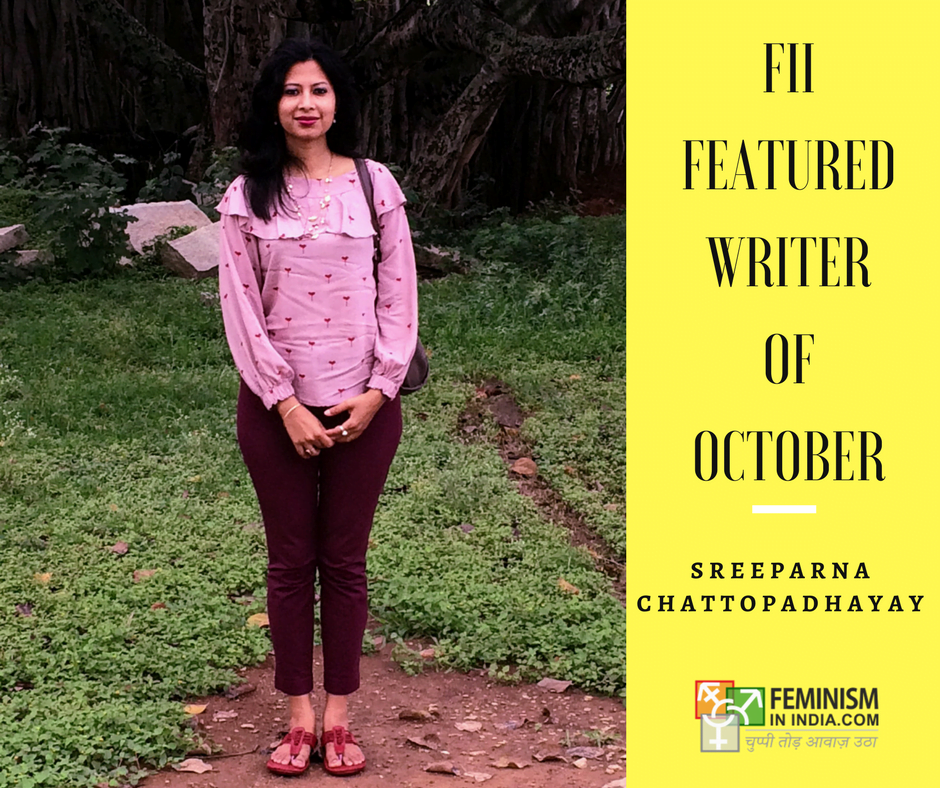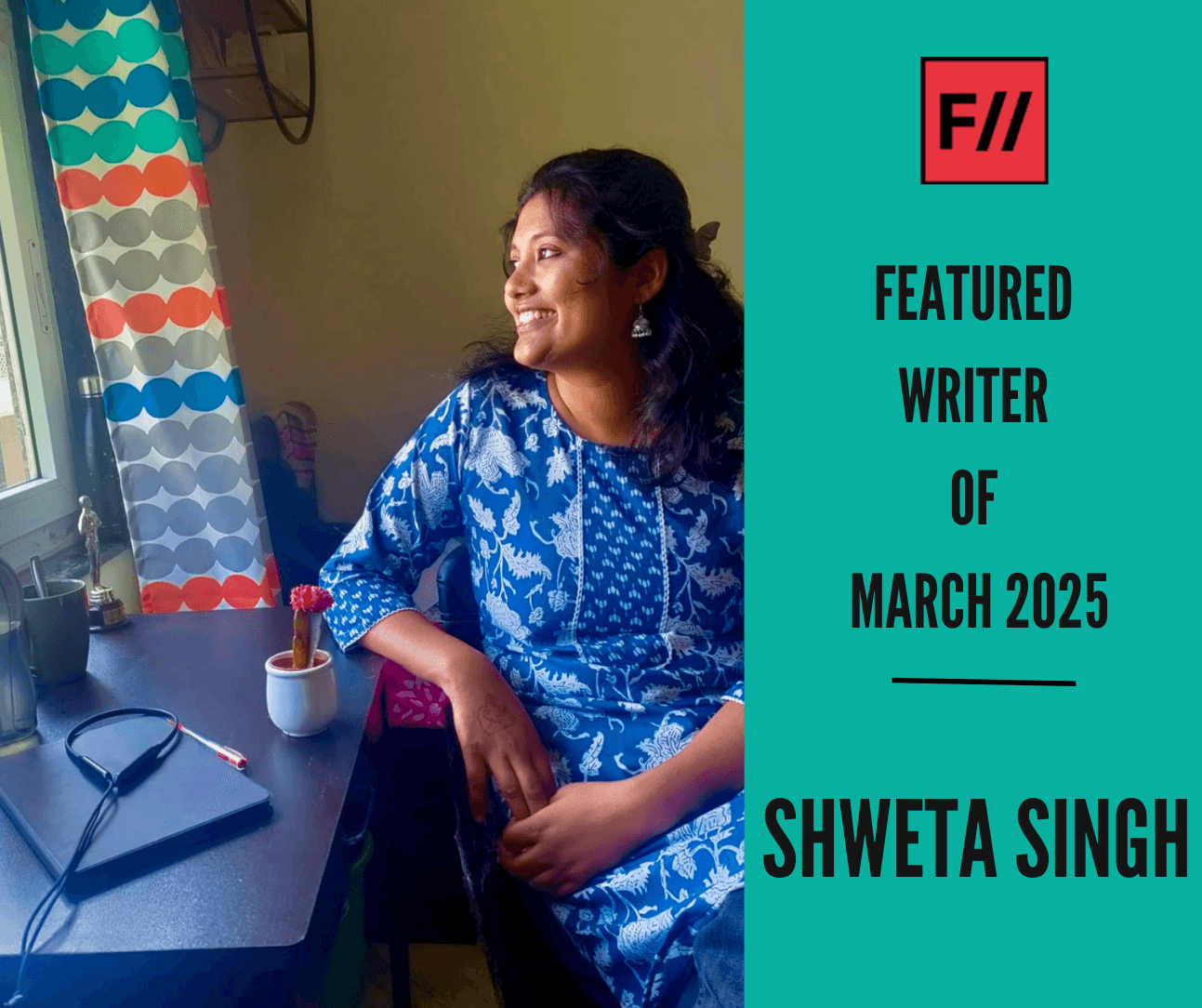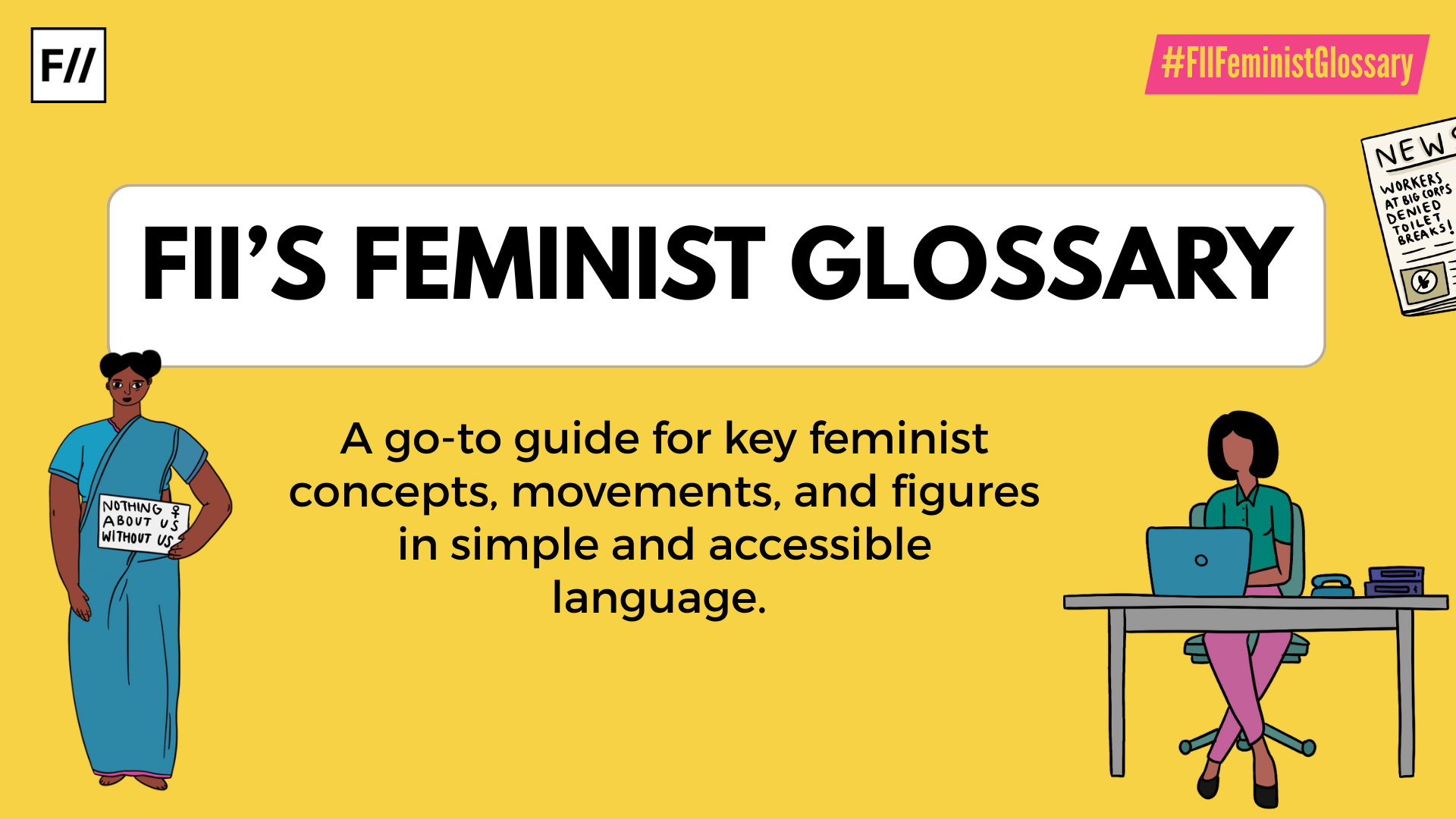This year, we have been featuring the best writers from our writer community for their committed contribution to FII, making it what it is today. FII would not exist if not for the passionate and loyal feminist writer community that we have steadily been building over the last three years. This month, we feature Sreeparna Chattopadhyay.
Sreeparna has a Ph.D. in Cultural Anthropology from Brown University with research interests in gender and its intersections with health, education family and the law. She is currently a Faculty member at Srishti Institute of Art, Design and Technology.
She started writing for us relatively recently – in June – and has regularly contributed to FII ever since. Her articles cover diverse themes from ranging from law and policy, news to pop culture. Some of her standout pieces are: her critique of chivalry, the Farooqui Judgement, her analysis of the patriarchal bargain and her review of Shubh Mangal Savdhan.
So without further ado, let’s meet the writer herself!
FII: Tell us a little about yourself and what you do.
SC: I finished my M.A. and Ph.D. in Cultural Anthropology from Brown University about 10 years ago. Since then I have had a career in pure and applied research both inside and outside of academia in India and abroad. Currently I teach in the UG and PG program at Srishti Institute of Art, Design and Technology.
Although the institute is primarily devoted to art and design education, there is a great emphasis on the liberal arts since a contextual understanding is fundamental for art and design practice. I see myself as a researcher, teacher, scholar and practitioner of feminist studies. My professional work has focused on the areas of gender-based violence, the law, gender and health and more recently gender and education.
FII: How did you become a part of the FII writer family?
SC: I became a writer for FII because I am a strong advocate for education. A good quality education that embeds equity as a fundamental concern in social inquiry is absolutely essential especially in contemporary India. However this is sorely missing in most of our institutions. Consequently it has become fashionable in some circles, including among upwardly mobile circles of young women to say they don’t need feminism or they do not want to be associated with the ‘label’.
This is despite the everyday discrimination they encounter as women. Gender identity and sexual expression is such an important aspect of our everyday experiences. Gender discrimination has concrete outcomes in our lives and my becoming part of the FII writer family was borne out of a desire to educate people about these outcomes with the hope that we will move towards a more egalitarian society.
FII: How and when did you become a feminist? Which issues within feminism are close to your heart?
SC: I can’t remember a particular moment in my life when I embraced the identity of being a feminist. I have always had feminist thoughts and practices and most of this credit goes to my parents. We are a family of two sisters and my parents always emphasised the importance of being financially independent and being educated.
My mother, despite her education (she was doing her doctoral work when she got married but didn’t have the chance to complete it) was a stay at home mom, partly by circumstances and partly because of the patriarchal norms prevalent in her generation. She was my first female role model in terms of thinking about how I wanted my life to be. The issues that are closest to my heart involve the treatment of women by the law as well as systematic and systemic mechanisms that create and sustain inequality.
FII: What is your favourite piece on this site that you have written, and your favourite piece on this site that you have read? Why did they strike you?
SC: I liked the article by Prannay Pathak on Male Privilege and Entitlement in India: A 101 Explainer Piece. He is extremely candid in his article and these lines in the end capture the essence of his article. “Privilege and entitlement are highly sociological phenomena, ingrained deeply in the minds of men across societies. However, they’re toxic, create rape culture, and undermine women’s agency. Concrete steps can be taken to keep these in check”.
Prannay uses simple language drawing from popular culture to unpack gender discrimination. I think it is very important to have men speak out against male entitlement because if the war against gender inequality is to be won, men need to be allies. I really enjoyed reading it.
From among the articles I have written I like this the most: So Long, Farewell – A Note To Graduating Students From A Gender Studies Professor. It is written in the first person and is an authentic and emotional account of my interactions with my students. Being a feminist is a difficult choice we make, especially because they often involve a heavy emotional price, and can also mean estrangement from families and friends.
It is important to have a support system of allies but often young feminists have told me they feel very alone and I hope that this letter not just gives them hope but also builds confidence so they are able to make those hard choices. I feel very proud of my former students who have indeed chosen a life that may be difficult, but at least it is on their own terms.
FII: What do you like to do when not writing about gender and social justice?
SC: I love cooking, spending time with my spouse and my six year old nephew. I like taking long walks, though this is becoming rarer sadly as green spaces are shrinking. I like mentoring young feminists so quite a bit of my time is spent on online or offline mentoring of former students.
I also enjoy watching films, traveling, reading books and listening to music. I spend a lot of my holidays with my family because for a good 13 years of my life I have lived away from them. And I constantly wish my day would spread to 36 hours instead of 24 hours!
FII: What do you like about FII and our work? What more would you like to see from us?
SC: I first learnt about FII when they announced the policy of “no appropriation”. It was a brave and necessary step to ensure that marginal experiences are not appropriated by those in positions of power and privilege. I like the content on FII especially the emphasis on the educative aspects of feminism and its intersections with other issues such as religious and caste-based oppression.
I have used quite a bit of the content for my teaching and especially like the section on Artivism. I congratulate FII for showcasing content that discuss some of the most urgent issues in the Indian context. It would be nice to see more articles in regional languages as always a greater focus on rural issues and also more men writing about gender, masculinity and patriarchy!
FII thanks Sreeparna for lending her enthusiasm and insight to our magazine and infusing it with her sharp, incisive commentary.You can follow her on LinkedIn. To become a part of our writer community, click here.
Featured Image Credit: Nitish Nair
About the author(s)
Feminism In India is an award-winning digital intersectional feminist media organisation to learn, educate and develop a feminist sensibility and unravel the F-word among the youth in India.




